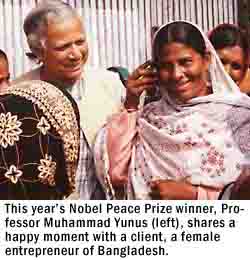Nobel Peace Prize winner makes
difference we can all be part of
Audio version:
Peace Prize winner
The surprise choice of this year's Nobel Peace Prize, Bangladesh Professor Muhammad Yunus and his  Grameen Bank, applied a simple idea and are making a huge difference in the world. By offering small loans to poverty-stricken entrepreneurs in third-world countries, Professor Yunus is providing the means for free enterprise to begin to transform communities and eventually nations. In particular, women are benefiting from the availability of micro-credit. Now banks and other institutions elsewhere in the world are starting similar programs modeled on Grameen Bank's initiatives.
Grameen Bank, applied a simple idea and are making a huge difference in the world. By offering small loans to poverty-stricken entrepreneurs in third-world countries, Professor Yunus is providing the means for free enterprise to begin to transform communities and eventually nations. In particular, women are benefiting from the availability of micro-credit. Now banks and other institutions elsewhere in the world are starting similar programs modeled on Grameen Bank's initiatives.
In an interview just after learning he won, Professor Yunus said this:
…[P]overty in the world is an artificial creation. It doesn't belong to human civilization, and we can change that, we can make people come out of poverty and have the real state of affairs. So the only thing we have to do is to redesign our institutions and policies, and there will be no people who will be suffering from poverty…. People come out of poverty every day. So it's right in front of us what happens and it can be done globally, it can be done more forcefully, we can organize more things to go with it, so this is something not theoretical issue, it's a very real issue…. We didn't do anything special; lend money to the people so – but they never lent it to the poor people – all we did was we lent it to the poor people, and that makes the trick. That makes the change.
Here is the the entire interview in text or Windows Media Player audio.
The amazing difference between this strategy and all the failures of the past is that here is someone taking a proactive approach to the seemingly intractable problems surrounding him. His motives are not altogether altruistic; his bank is actually turning a profit.
Why can't the rest of the world take a lesson from Professor Yunus and either adopt or adapt his strategy? When we do, an amazing societal metamorphosis is possible.
The Proactive Messiah
The Lord Jesus Christ took a similar approach when He "went around doing good" (Acts 10:38). He invested in people, communicating to them that they had value and tremendous potential. He convinced them that He believed in them and that He was willing to sacrifice for their benefit.
As His Follower, Accept His Challenge!
Jesus challenges His followers to do the same in their world. "Give to the one who ask something of you, and do not turn away from the one who would borrow from you. …That you may be sons of your Father in heaven. He causes His sun to rise on the evil and the good, and sends rain on the righteous and the unrighteous" (Matthew 5:42, 45).
Your investment need not be money. The person you meet may only need a moment's attention, eye contact, an open smile, a friendly conversation, a ride of a few blocks, or directions in an unfamiliar part of town. You have the opportunity to communicate that you care, that you think he or she has worth as a human being, that you don't view them as an "untouchable."
As they respond to your kindness, warming up to your proffered friendship, it's time to confess Christ. In simple ways that are not abrasive, you can let them know that you follow Jesus, and that makes all the difference in your life. It's because of Him that you see hope—hope for our world and hope for them. Because He has invested in you, you are willing to invest in them.
Be proactive--make a change for the better in the world around you!
Want to go deeper?
Palestine of the first century was filled with beggars. These needy people were constantly asking for money and seeking other assistance. Jesus certainly had the power to wave His hand and heal them all in an instant. Why didn't He? Because He had a higher purpose.
He wasn't content to cure paralysis of the limbs and blindness of the eyes. His intent was to reach down into the soul and bring healing to a paralysis of the will and blindness of the heart. He didn't have to touch people to heal them; He proved that on occasion. His touch was therapeutic on a deeper level than just eradicating disease and deformity. It communicated love, acceptance, and esteem in an awesome, life-changing way.
Do you own study of these passages: cleansing a leper—Mark 4:40-45; healing a deaf mute—Mark 7:31-37; blessing the children—Matthew 19:13-15; and healing two blind men—Matthew 20:29-34.
Look also at the times when He sought and/or accepted help from someone. What did this communicate? Are we merely patronizing people, or do we see them as our companions in life's journey?
Take a look at these incidents: asking for a drink—John 4:4-42; asking for a place to stay in a strange town—Luke 19:1-10; accepting a gift of gratitude from a friend—John 12:1-8. Read also Paul's command in Romans 12:14-20, and ask yourself, "What would the world be like if we made this our lifestyle?"
To learn more about Muhammad Yunus and Grameen Bank go to their official website.
Steve Singleton, DeeperStudy.com
» Post a Comment